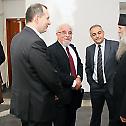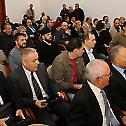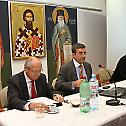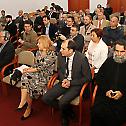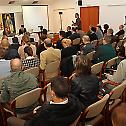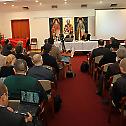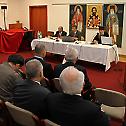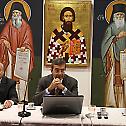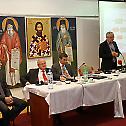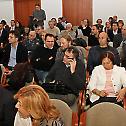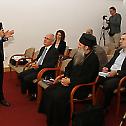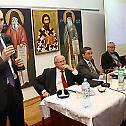The Balkans and the Middle East: Do They Reflect Each Other?
On the occasion of the centennial of the First World War, The Conference The Balkans and the Middle East: Do They Reflect Each Other? was opened on October 17, 2012 at the parish house of Saint Sava church on Vracar. The Conference was co-hosted by the Office of the Committee of the Holy Assembly of Bishops for Kosovo and Metohija, the Faculty of Security Studies of the University of Belgrade and the Belgrade Open School.
On the first session there were two lectures held by Mr. Martin Van Creveld from the Tel Aviv University on the subject A Tale of Two Disasters, and Shaul Shay from Begin-Sadat Center for Strategic Studies, Bar Ilan University, Tel Aviv on the subject The Middle East between Democratization and Islamization.
The other part of the conference began with a presentation of Mr. Darko Tanaskovic from the Faculty of Philology of the University of Belgrade on the subject: The Balkans and the Middle East: Turkey’s Regional Priorities. Mr. Srdja Trifkovic from the Faculty of Security Studies of the University of Banja Luka lectured on the subject: A Hundred Years Later: Turkey is Back.
Mr. Vladimir Ajzenhajmer from the Centre for Asian and Far East Studies, Faculty of Political Sciences of the University of Belgrade held a lecture on the subject: The Western Balkans and the Islamic Schisms.
Mr. Dusan Batakovic held a closing discussion of the participants of the conference. Also H.E. Joseph Levi, the Ambassador of Israel in Serbia addressed the participants of the conference.
SUMMARIES AND BIOGRAPHIES
Martin Van Creveld
Tel Aviv University, Tel Aviv
A Tale of Two Disaster Areas
Judging by the ranking of the various countries on the U.N's Human Development Index, both the Balkans and the Middle East are disaster areas. In both cases the origins of this sad state of affairs can be traced back to centuries of Ottoman mismanagement, the disintegration of the Ottoman Empire, and the establishment of new borders that took no account of national, political, economic, social and cultural factors. In this mess, one country stands out: Israel. I shall very briefly survey the roots of its success, and suggest that Serbia may have something to learn from it.
One of the most distinguished military historians today, Martin Van Creveld holds M.A. from the London School of Economics, and B.A. and Ph.D. from the Hebrew University of Jerusalem where he was on the faculty since 1971. «Transformation of War» is the most famous of his eighteen published books, and «The Age of Airpower» the latest one; the book about the war games is in the print.
Darko Tanasković
Faculty of Philology, University of Belgrade, Belgrade
The Balkans and the Middle East: Turkey's Regional Priorities
The Balkans and the Middle East have been openly and repeatedly declared as two regional priorities of the actual foreign policy of Turkey , based on the neo-Ottomanist doctrine of so called „Strategic Depth“, theoretically elaborated by its minister of foreign affairs Ahmet Davutoğlu and by all available means put into practice systematically during at least last decade. Although the world media devotes considerably less attention to Turkish doings in the Balkans than to Ankara’s policies in the Middle East, there is good reason to believe that for many reasons neo-Ottomanism may actually be more dynamic and more ambitious in Europe’s soft underbelly. The fact that the subjects in international community whose judgement Turkey especially cares about consider Turkey a legitimate and reliable factor of peace, stability, and development in the Balkans must be a strong motive for the foreign policy of this geographically mostly Asian country to feel the Balkan region as its practical and symbolic priority on its way towards the EU. Although seemingly there is no direct link between the lines of Turkey’s engagement in the Balkans and in the Middle East, its activities in these two regions should be analysed and interpreted comparatively and organically, as two facets of the same complex phenomenon and to some degree even interdependent. Such an approach would allow us to evidentiate some important typological features of neo-Ottomanist ideological pattern as well as its practical political potentials, contradictions and limitations.
Darko Tanasković is former Yugoslav and Serbian ambassador to the Republic of Turkey, Aserbaijan, and the Vatican. He holds B.A., M.A. and Ph.D. in Oriental Philology from the University of Belgrade, where he teaches until today. Dr Tanasković published more than 600 works including twelve books, “Neo-ottomanism” being the latest one.
Srđa Trifković
Faculty of Political Sciences, University of Banja Luka, Banja Luka
A Hundred Years Later: Turkey is Back
It is historically unprecedented for a former great power which undergoes a period of steep decline to make a comeback and reestablish its position as a major player in world affairs. After the Peloponnesian War Athens was finished for all time. Following the collapse of the Western Empire, Rome has never regained its old stature and glory. After Philip II Spain declined precipitously and has remained a third-rate power ever since. The list goes on.
Turkey appears to be an exception to the rule. One hundred years after the fate of the Ottoman Empire was seemingly sealed in the First Balkan War, the Turkish Republic has an ever-increasing clout in three key areas of neo-Ottoman expansion: the Balkans, the Arab world, and the predominantly Muslim regions of the former Soviet Union. Each has played a significant part in reshaping the geopolitics of the Greater Middle East over the past decade. This complex project, which remains under-reported in the Western media and denied or ignored by policy-makers in Washington, is going well for Prime Minister Rejep Tayyip Erdoğan and his AKP (Justice and Development Party).
Dr. Trifkovic's paper looks at the causes and dynamics of this remarkable transformation, which has fundamentally changed -- over the past decade -- the security architecture of the region.
Srđa Trifković is foreign affairs editor for “Chronicles: A Magazine of American Culture”. Trifković earned a B.A. from the University of Sussex and from the University of Zagreb and a Ph.D. from the University of Southampton. He is the author of several books, including “Ustasa: Croatian separatism and European politics, 1929-1945” and “Sword of the Prophet: The Politically Incorrect Guide to Islam”, a much discussed book about the history and tenets of Islam.
Vladimir Ajzenhamer
The Centre for Asian and Far East Studies, Faculty of Political Sciences
University of Belgrade
The Western Balkans and the Islamic Schisms
For centuries, Western Balkans Muslims have tied their religious identity to the Ottoman Empire and for Hanafi school of Islam, which was the dominant interpretation of Islamic religious teaching on the European territory of the Ottoman Empire. With the war events that followed the dissolution of Yugoslavia, the other interpretations of Islamic teachings found their way to this region. This had a significant impact on the change in religious consciousness and understanding of Islam among the local Muslim population. Under the mask of Islamic solidarity and through political, military and humanitarian aid, Salafi teachings, as well as the Shia interpretation of Islam, arrived to this region from the Muslim states of the Middle East. In this way traditional Ottoman Islamic heritage has ceased to be the only form of practicing Islam, and space was created for a different Islamic religious teachings which originating from Middle Eastern countries. States such as Saudi Arabia and Iran have thus made considerable religious and political influence over the Balkan Muslims, thereby becoming, besides Turkey (which has a traditional presence and influence among Muslims of this region) another "external" determinant of their internal religious and political relations. In this paper we analyze the problem of religious and political divisions among the Muslims of the Western Balkans, caused primarily by importing "new" interpretation of Islamic teachings from the Middle East. Through a comparative overview of the situation in Bosnia-Herzegovina, Serbia, Montenegro, Macedonia and Albania author tends to point out the serious religious and ideological divisions among the local Muslims, and to show what kind of religious, political, and security implications this crisis of religious identity can cause.
Vladimir Ajzenhamer is Ph.D. student at the University of Belgrade, where he obtained his B.A. and M.A. at the Faculty for Political Sciences. Religious dimension of political procesess in the Middle and Far East is among his main interests.
Shaul Shay
Begin-Sadat Center for Strategic Studies, Bar Ilan University, Tel Aviv
The Middle East between Democratization and Islamization
The Islamic evolution is stronger than the “Arab spring” revolution: The "Arab spring" revolutions launched by young activists using all the resources the Internet has to offer, have paved the way for Islamist movements. The main actors for change have been the youth. The first beneficiaries have been the Islamists because they are structured and because they have deep roots in society, unlike the youth who have not had time to organize. The outcomes of recent Arab uprisings have confirmed the organizational superiority and appeal of Islamist political parties in a number of countries in the Middle East.
The "Arab Spring" that reshaped the region’s political landscape, marked by fragile transitions from secular pro western dictatorships through a "democratic procedure" to the formation of Islamic regimes. This “tsunami” has moved tectonic plates of the Muslim societies and will provoke aftershocks that will lead to an Islamic dominant region.
The Islamic fundamentalism and the democracy: Hasan al-Banna (1906-49), the founder of the Muslim Brotherhood that came to power in some Muslim states, sought to purge Western influences. He taught that Islam was the only solution and that democracy amounted to infidelity to Islam. Sayyid Qutb (1906-66), the leading theoretician of the Muslim Brotherhood, objected to the idea of popular sovereignty altogether. He believed that the Islamic state must be based upon the Qur'an, which he argued provided a complete and moral system in need of no further legislation.
More recent Islamists such as Yusuf al Qaradawi argue that democracy must be subordinate to the acceptance of God as the basis of sovereignty. Democratic elections are therefore heresy, and since religion makes law, there is no need for legislative bodies. In recent years there could be observed a change in strategy used by radical Islamic organizations. Muslim Brotherhood openly seeks to establish “democracy” based upon Islamic principles. Islamists themselves regard liberal democracy with contempt. They are willing to accommodate it as an avenue to power but as an avenue that runs only one way. The Islamic world is not ready to absorb the basic values of modernism and democracy nor does acceptance of basic Western structures imply democracy.
The Islamists are using a "double talk". They try to present to the west a moderate image of political Islam, to encourage the west to help and invest. But within the Muslim society the reality is different and most of the voices are very conservative.
Historical changes happening in the region now are for sure equivalent to the shift of tectonic plates politically. This is a crossroad in history and the road the nations involved take will determine our future. In the meantime we might see more Islamization there rather than western style democracies. Where it will really lead Middle East and the rest of the world only future will tell.
Col. (Res.) Shaul Shay is former head of the IDF Military History Department and former deputy head of the National Security Council of Israel. He holds M.A. and Ph.D. degrees from the Bar Ilan University with special interest in counter-terrorism; he is a lecturer at his alma mater and the Interdisciplinary Center, Herzliya (IDC); Dr Shay is also a senior research fellow of the Begin–Sadat Center for Strategic Studies and the author of the book «Islamic Terrorism in the Balkans».
Gordon N. Bardos
The Balkans Security and Politics Expert, New York
Assessing the Threat of Militant Islamism in Southeastern Europe
Many of the major terrorist actions of the past fifteen years, including the 9/11 attacks, the Khobar Towers bombing, the bombings of the US embassies in Kenya and Tanzania, the bombing of the USS Cole, etc., have Balkan connections. This paper will review the history of the emergence of the militant Islamist movement in Southeastern Europe, assess the degree of the current threat to the region posed by radical extremists, and review the various policy options available to local governments and the international community for dealing with the threat.
Gordon N. Bardos is former assistant director of Harriman Institute at Columbia University and an executive officer of the Association for the Study of the Nationalities. Bardos holds Ph.D. from Columbia University and his special interest is in the Balkan conflict and its connection to similar regions in the world.
Boris Havel
Faculty of Political Sciences, University of Zagreb
Theology Shaped By Politics: Fact in the Middle East,
Potential in the Balkans?
Conflict in the Middle East is complex and complicated. There are many aspects of it, such as national, economic, territorial, security-related, psychological and historical. Analyzing any of them would help us understand it better. However, there is one aspect which, if ignored, would leave any analysis wanting: religion. While for a long time the mainstream media and academia chose to disregard its importance in the Middle Eastern conflict, after the events of September 2001, and after the wave of Islamic terrorism in Israel the following year, more scholars and analysts did actually pay significantly more attention to it. Thus, the fact that religion to a degree influences Middle Eastern politics, primarily in the Muslim community, has become impossible to ignore.
Even though that recognition came about, it is usually shallow and rarely sufficiently discoursed. To understand it properly, particularly in a scholarly setting, one should approach it in a multidisciplinary manner involving at least three fields of research: political science, history and theology. Applying the three in the study of the Holy Land, one would learn that since the Israelites conquered Canaan and until today, one or more religious communities have always perceived government over the land as determined by its spiritual condition. Even though many rulers, kingdoms and ideologies have swept through Eretz Israel/Palestine, political religion has, for the past three millennia, always been the constant.
The issue which I find particularly interesting, and to which I devoted much research, is not so much how much and in which way religion has influenced politics, but rather what happened vice versa: how the current Middle Eastern conflict and the reestablishment of Jewish state influenced Jewish, Christian and Muslim theology. It may come as a surprise to some, but the amazing and miraculous history of the Zionist movement and subsequent emergence and survival of the State of Israel did prompt some profound changes in parts of theological thought in all three religions.
Orientalists would find it least unexpected in the case of Islam. Not a few Muslim beliefs appeared as outcome of political struggle and social circumstances (the Prophet’s promise of Paradise to participants killed in marauding raids against Meccan caravans, declaring Jerusalem holy by Caliph in Damascus contesting his political rival in Medina etc.). Since Jewish military superiority has been unknown in Islamic tradition and previous history, some religious novelties were introduced in combating Israel, most notably acknowledging suicide-terrorists as shaheeds by prominent Islamic scholars (Qaradawi etc.).
In Judaism, political Zionist activism has been increasingly recognized as theologically legitimate step toward introducing eschatological and messianic era. This trend has been gaining momentum particularly after the Six Day War of 1967.
Finally Christianity[i], which for centuries harbored religious anti-Jewish sentiment, in the second half of the 20th Century saw emergence of massive religious philo-Semitism, and Christian Zionism (the interesting question not yet scholarly examined is which came first). Only a hundred years ago a Christian who would claim that the Old Testament as interpreted by Jews is still theologically valid, would be branded a heretic; three or four hundred years ago he could have been burned at the stake for suggesting such an idea. And yet, the establishment of the State of Israel brought about a profound theological change on the issue: Christians reconsidered the meaning of the word Israel. Christians increasingly see Israel as root of their faith and the Jewish people as their older brothers, worshipers of the same God; a nation not replaced by the Church as chosen and blessed (as has been demonstrated by recent history, and history have epistemological theological value in both Judaism and Christianity), but rather a nation from which salvation came and to which Christian gratitude is due. To be sure, Christian theological nearing to Jewish people and their faith is not solely product of political developments in the Middle East. Yet, there are some convincing arguments that the establishment of the Jewish state may be the main factor behind prompting it.
Now, if Christians and Jews have come each other closer and recognized their common values and parts of theology, based on shared Scripture, wouldn’t it be logical to expect different Christian branches to pursue the same path? After all, Christian denominations have more in common theologically than any main Christian denomination and Judaism do. It is therefore not a surprise that in the Middle East different movements promoting Christian unity and cooperation have been active (ICEJ being one of them). Again, political cause is not the only, and possibly not even the most important reason behind new-found theological, ethical and civilizational common ground which different Christian branches share, but it is quite probable that politics – epitomized by recognition of reestablishment of political Israel as God’s work in history – was the main factor behind prompting these considerations. Namely, as branches find the place of unity – by going back to the Olive tree, which is Israel – it is hard to disregard the fact that their very detection that the Olive tree still even exists, took place because the Olive tree emerged as a political entity.
Conflicts in the Balkans are in many ways unique and in many details differ from the conflict raging in the Middle East. And yet, Balkans-conflict contains some features which make it a political set-up probably the most similar to the Middle Eastern in the world. Perceptible reality and threat of the global jihad is one of them. Comparative civilizational proximity of non-Islamic political actors is another. Could those similarities inspire Balkan Christians to view each other through different eyes than they used to? Could divided and often antagonized Balkan – and for that matter all European – Christians perceive each other in a different way: as servants of the same King, children of the same Kingdom and partners in the same mission of bringing it on Earth as it is in Heaven? Based on what we have seen in Jewish-Christian relations in the Middle East, I believe that it is not unrealistic to expect positive spiritual development emerging out of the harsh and tough political circumstances. In spite of past animosity and conflicts, the rift between, say, Catholics and Orthodox Christians have not been deeper and wider than the one between Christians and Jews. Why then should it be less bridgeable?
Boris Havel holds B.A. from Livets Ord University/Oral Roberts University, M.A. from Hebrew University of Jerusalem and Ph.D. from University of Zagreb, with the interest in Islam, the religious dimension of the Middle East conflict and Christian Zionism.
[i] Here I am referring primarily to the Evangelical and to a lesser degree to Catholic Christianity. Orthodox Christianity has not been a field of my deeper study yet.
Darko Trifunović
Faculty of Security Studies, University of Belgrade, Belgrade
Geopolitics and Regional Security: the Role of Turkey, Iran and Saudi Arabia in the Southeast Europe
The long-lasting antagonisms of the Middle East, its multidimensional conflicts, as well as manipulations by religion, have been reflected on the Balkans during and after the civil war in Bosnia and Herzegovina. The fundamental conflict on the relation Saudi Arabia-Iran, has gained new forms in Bosnia and Herzegovina. The race for controlling Bosnian Muslims has left the biggest consequences on the change of their identity, especially in the domain of religion by the appearance of Mujahedins, Al-Qaeda and Wahhabis. Iran, Saudi Arabia and recently Turkey are trying to accomplish their interests by using all means, manipulating by religion and by using Balkan's population of Muslims as the instrument for reach their goals.
Darko Trifunović holds B.A. from the Law School at the University of Belgrade and Ph.D. from the Faculty of Security Studies, where he works today. He published the book “Islamic Fundamentalist's Global Network - Modus Operandi - Model Bosnia” and is regularly participating at annual conference at the International Institute for Counter-Terrorism at Herzliya.

